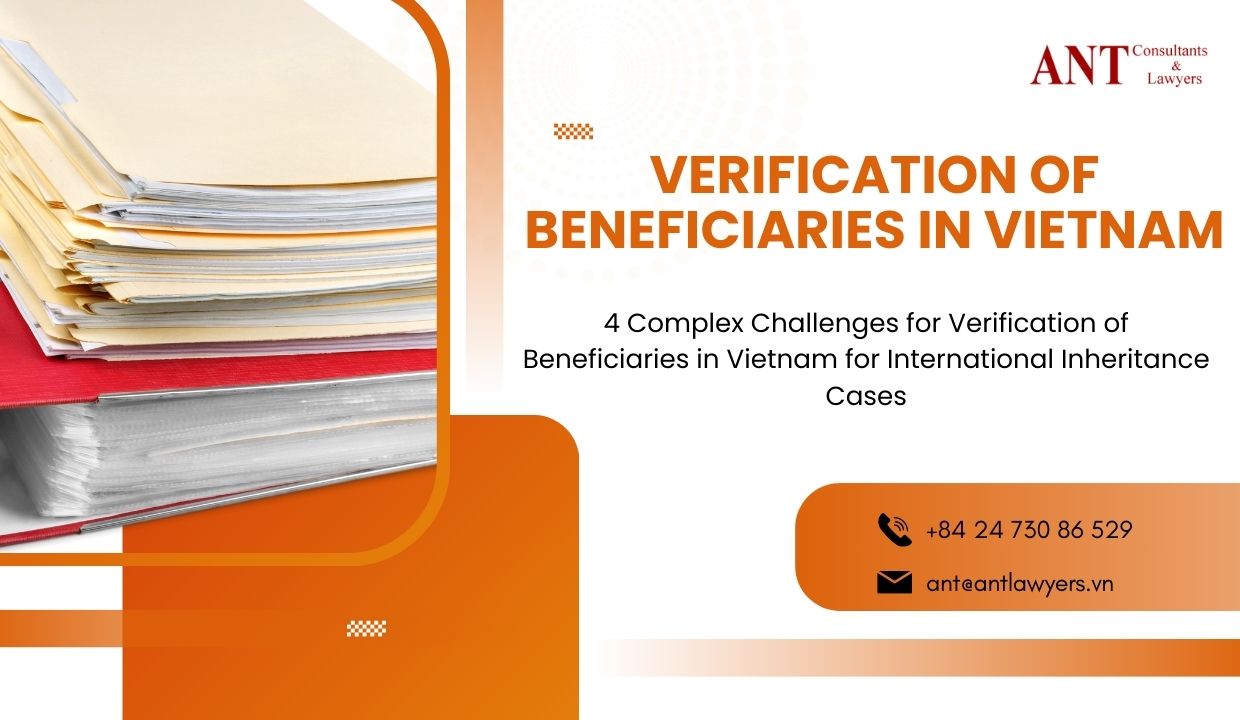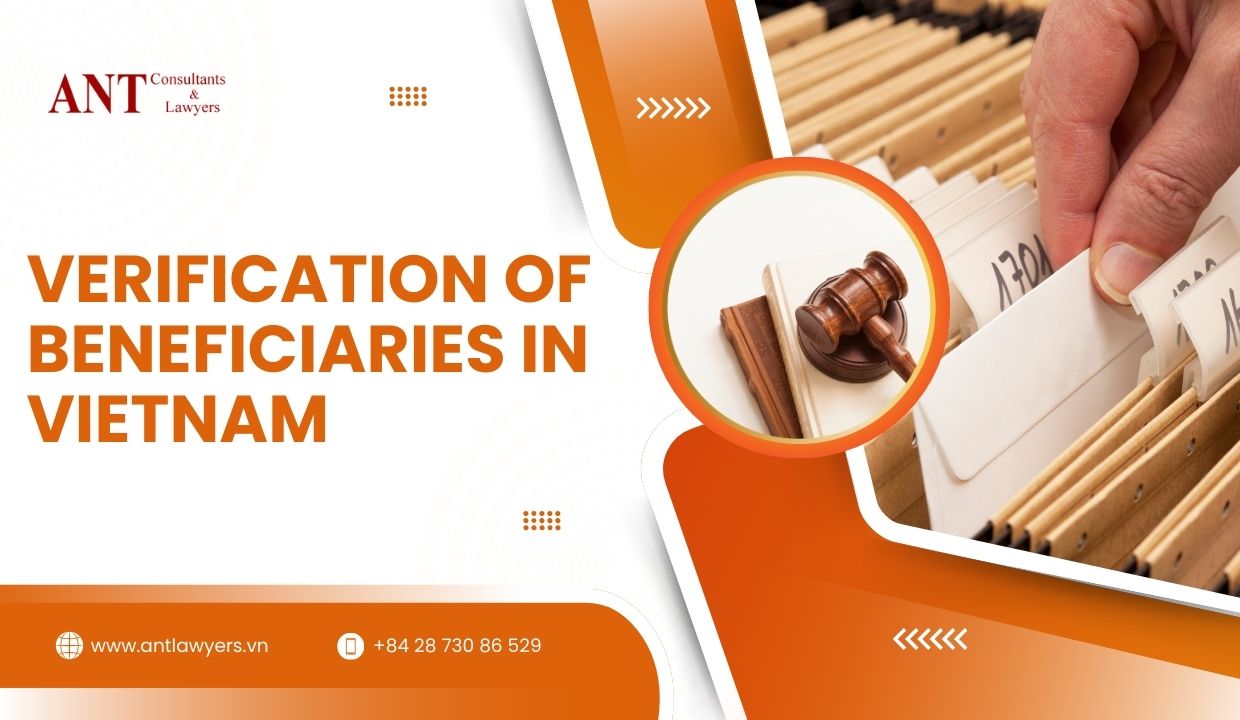4 Complex Challenges for Verification of Beneficiaries in Vietnam for International Inheritance Cases


Verification_of_Beneficiaries_in_Vietnam
When dealing with international inheritance, one of the most difficult tasks can be verifying the rightful beneficiaries, especially when the property in question is located in a foreign country and the heirs reside in Vietnam.
This process involves navigating a host of challenges, from locating heirs to ensuring proper documentation is provided to establish their right to inheritance. The process becomes even more complicated when beneficiaries are hard to find or when the necessary documents have been misplaced or lost over time.
In the following, we will focus on the verification of beneficiaries in Vietnam for properties located abroad, highlighting the four most significant challenges faced in the process and providing insights into how these challenges can be mitigated.


Cross-Border Complexities: Locating and Verifying Heirs from Vietnam
One of the primary difficulties in international inheritance cases is the challenge of locating beneficiaries who live in Vietnam. The verification of beneficiaries in Vietnam is often complicated by the fact that heirs may not have maintained regular contact with the deceased or other family members.
In some cases, the available information about the heirs may be outdated or incomplete, making it extremely difficult to track them down.
Heirs might be elderly or live in rural areas where communication infrastructure is limited. In many cases, the beneficiary’s last known address may be outdated, and they might not be easily reachable.
Contacting these heirs becomes a logistical issue, especially if there is little or no cooperation from local authorities or relatives. In cases where the heirs are elderly, they may not fully understand the legal processes involved or may be unwilling to cooperate due to distrust of foreign legal proceedings.
Additionally, finding contact information such as phone numbers, email addresses, or even physical addresses can be a time-consuming process. In many instances, inheritance cases are delayed because executors or legal representatives are unable to gather the information needed to contact heirs in Vietnam.
This lack of communication not only slows down the process but can also lead to disputes if other heirs feel the inheritance is being mishandled or delayed unnecessarily.
The issue of incomplete or inaccurate information can further exacerbate the situation. For instance, when information about beneficiaries is limited, it often becomes necessary to turn to local Vietnamese authorities or institutions to help trace the whereabouts of the beneficiaries. However, the bureaucratic process involved can be lengthy, and cooperation from these entities can be slow or inefficient, adding to the frustration of the process.
Proving Heirship: Complexities in Gathering and Authenticating Documents in Verification of Beneficiaries in Vietnam
Another major hurdle in the verification of beneficiaries in Vietnam is the challenge of gathering and authenticating the necessary documents that prove the heir’s relationship to the deceased.
International inheritance cases often involve beneficiaries needing to prove their family connection to the deceased with documents like birth certificates in Vietnam, family registries, or marriage certificates. However, these documents may have been lost, misplaced, or simply not exist due to outdated record-keeping systems in Vietnam.
In some cases, family registries or birth certificates might be incomplete or incorrect, causing difficulties in proving a legal relationship between the heir and the deceased. For beneficiaries who have lived abroad for extended periods or moved frequently, obtaining these records from Vietnamese authorities can be a daunting task.
Furthermore, the process of translating documents from Vietnamese into the language required by foreign courts and authenticating these translations adds additional layers of complexity.
In many cases, legal professionals are required to collect documentation from multiple jurisdictions, particularly when heirs or the deceased have lived in more than one country. The cost and time involved in obtaining, authenticating, and translating these documents can delay the entire process. Moreover, even minor discrepancies in names, dates, or personal details can lead to rejection of the documents, forcing beneficiaries to go through additional verification steps.
Misplaced documents, especially in families with a history of migration or displacement, present a significant roadblock. When essential documents cannot be retrieved, executors may resort to alternative forms of proof, such as witness statements, to establish heirship. However, these alternatives are not always accepted in all jurisdictions and may result in additional legal challenges.
Limited Cooperation in Verification of Beneficiaries in Vietnam
Another frequent issue in the verification of beneficiaries in Vietnam is the limited cooperation from heirs. In many international inheritance cases, heirs may not be fully aware of their inheritance rights or may have a misunderstanding of the legal process.
In some instances, heirs might be suspicious of receiving unexpected communications about an inheritance from abroad, particularly when they are not familiar with foreign legal systems.
For elderly beneficiaries, their limited understanding of legal processes can result in confusion and hesitation to participate. The need for extensive paperwork, signing documents, and following up with authorities may seem overwhelming.
This can lead to delays as legal representatives struggle to obtain the necessary cooperation from heirs who are unresponsive or unwilling to engage in the process.
In other cases, heirs may simply be hard to reach. Vietnam’s rural areas often lack modern infrastructure, making communication with beneficiaries living in these regions difficult. Without access to the internet, or even reliable phone service, legal representatives may face months of delay in establishing contact.
Furthermore, language barriers can complicate communications, especially if the heirs are elderly and less familiar with legal or formal terminology.
Some beneficiaries may also distrust the entire process, especially if they believe the inheritance is a scam or fear losing control over their assets or rights. In such cases, it may be necessary for executors or legal representatives to work with local intermediaries, such as trusted family members or community leaders, to reassure beneficiaries and encourage them to cooperate.
Disputes Among Heirs and Challenges to Verifying Claims
Finally, disputes between heirs can create substantial roadblocks in the verification of beneficiaries in Vietnam. These disputes often arise when multiple heirs are involved, each with competing claims to the inheritance. For example, biological children, adopted children, or distant relatives may contest each other’s legitimacy as beneficiaries, leading to legal battles over the estate.
In cases where the deceased left behind a will, beneficiaries may challenge its validity if they believe it unfairly favors one heir over another. Disputes may also occur if one beneficiary believes that another heir is not truly entitled to their share of the inheritance. This situation becomes more complex when documents proving heirship are incomplete or missing, or when family relationships are difficult to confirm.
Moreover, disagreements often arise when there is a lack of clear communication or transparency about the inheritance process. Beneficiaries may feel that they are being left out or not receiving adequate information, which can lead to suspicion and conflict. Legal representatives must carefully manage these disputes by ensuring that all beneficiaries are kept informed and that the process is transparent and fair.
In addition, some heirs may attempt to delay the process deliberately, either by refusing to cooperate or by filing legal challenges. This can drag the verification process out for months or even years, creating unnecessary complications for the rightful beneficiaries.
Conclusion on Challenges of Verification of Beneficiaries in Vietnam
The verification of beneficiaries in Vietnam for properties located abroad is a complicated process with challenges. From the difficulties of locating heirs and gathering necessary documentation to the complexities of gaining cooperation and resolving disputes among beneficiaries, legal professionals must navigate a myriad of hurdles to ensure that the rightful heirs receive their inheritance.
Successful process of the verification of beneficiaries in Vietnam requires a proactive approach, including working closely with local authorities, ensuring that all required documents are gathered and authenticated, and addressing the concerns or hesitation of heirs. By understanding these key challenges, executors and legal professionals can better manage the process, ensuring a smoother and more efficient verification of beneficiaries in Vietnam for international inheritance cases., fostering a more inclusive and equitable society.
About ANT Lawyers, a Law Firm in Vietnam
We help clients overcome cultural barriers and achieve their strategic and financial outcomes, while ensuring the best interest rate protection, risk mitigation and regulatory compliance. ANT lawyers has lawyers in Ho Chi Minh city, Hanoi, and Danang, and will help customers in doing business in Vietnam.
How ANT Lawyers Could Help?
You can learn more about ANT Lawyers by contacting us for consultation via email at ant@antlawyers.vn or by calling our office at +84 28 730 86 529
Recent Posts
5 Crucial Facts About ESG Laws in Vietnam That Could Save Your Business and Reputation
The Business World Is Changing Fast Rules are shifting. Expectations are rising. Eyes are watching. …
7 Powerful Reasons Why ESG Compliance in Vietnam Will Win You Trust, Growth, and Global Clients
Trust matters. Today, more than ever. Across industries, many companies are now being asked. directly…
7 Bold Reasons Why Tokenization in Vietnam Could Transform Your Future
Change is coming. Quietly. Digitally. Rapidly. Let’s imagine the situation, which assets are no longer…
Vietnam P2P Lending: 5 Bold Reasons Why Decree 94/2025 Could Empower Millions or Backfire?
A New Financial Chapter Begins in Vietnam One person lends. Another borrows. It’s that simple.…
5 Essential Lessons from Risk Management in Digital Assets in Vietnam: Protecting Trust in a Digital World
Trust Is the Real Currency Money can be lost. Tokens can vanish. Platforms can crash.…
5 Powerful Reasons Why Vietnam Digital Asset Sandbox Is a Bold and Hopeful Move for Innovation
Change is fast. Rules are slow. But innovation can’t wait. As digital assets grow, so…




